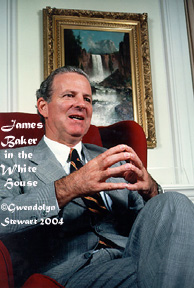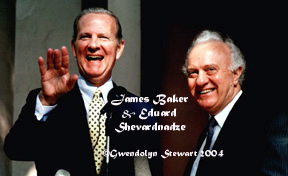
JAMES A. BAKER III
Gwendolyn Stewart

JAMES ADDISON BAKER, III, attorney, friend and friendly competitor to George Herbert Walker Bush. Chief of staff and then Secretary of the Treasury to Ronald Reagan; Secretary of State to the first president Bush; major player in securing the election of the second when it went to the Supreme Court. Photographed by GWENDOLYN STEWART in the Reagan White House (c. 2014)
U.S. Secretary of State JAMES A.
BAKER III & USSR Foreign Minister EDUARD SHEVARDNADZE Photographed by GWENDOLYN STEWART c. 2014 * * *
* From RUSSIA REDUX, Chapter
Three: MOSCOW & THE GULF WAR
In September 1989, the U.S. Secretary of State, James A. Baker, III,
had hosted the Soviet Foreign Minister, Eduard Shevardnadze, at his home in
Jackson Hole, Wyoming, in the gorgeous natural setting of the Grand Tetons.
Now, from the whole wide canvass of the USSR, Shevardnadze had chosen Lake
Baikal, this gem of Siberia, and not something from the mountains of his
native Georgia (famous for its mountains) to "pay back" Baker for his
hospitality. Their "informal" meeting featured hydrofoiling over Baikal
itself, and fishing on the Angara River, the only river to flow out of the
lake. (Three hundred thirty-some rivers and streams flow in.)
* * * More to come in RUSSIA REDUX * * *
More on politics in PICTURE POLITICS
* * * * * * * * IN THE WORKS: A book based on the
Harvard exhibit of a quarter-century * * * * MORE WORK BY GWENDOLYN
STEWART: LEONARD BERNSTEIN THE BIG DIG BILL
BRADLEY GEORGE W.
BUSH
JIMMY CARTER BILL
CLINTON GAO
XINGJIAN MIKHAIL GORBACHEV
JIANG
ZEMIN JANIS
JOPLIN BARACK OBAMA
TIP O'NEILL
SAKHALIN
FREDERICK
SALVUCCI ANNE
SEXTON JOHN
UPDIKE
DAN WAKEFIELD BORIS
YELTSIN YELTSIN'S
MIDNIGHT DIARIES GWENDOLYN STEWART: MORE PHOTOGRAPHS & MORE ABOUT THE
AUTHOR/PHOTOGRAPHER
© Copyright 2014 Gwendolyn
Stewart. All Rights Reserved.

in Irkutsk,
after their Summit on Lake Baikal, August 1990.
On my first trip to the Soviet Union in 1984, I had been confined
to the very limited region at the toe of Baikal, because, as I was
informed, I was "not from a socialist country."
The changes under Mikhail Gorbachev meant that on August 2, 1990,
a few other journalists and I could board a special hydrofoil with
Shevardnadze and Baker, who was definitely also "not from a socialist
country." Baker the smooth, Baker the clever, Baker the very un-socialist
Houston attorney: I had photographed him in his office when he was
Ronald Reagan's chief of staff. I had photographed him at IMF-World Bank
meetings in his next capacity as Secretary of the Treasury. I had photographed
him reading carefully from his briefing book at his Secretary of State
confirmation hearings, as the Senators quizzed him about countries he was
having to quickly get up to speed on.
Now I was capturing him cozily comfortable with his Soviet
counterpart in the front of the cabin, as their hydrofoil whipped over the
lake. In my wide angle lens, their pleasure in the scene was patently
evident. One -- KGB? -- official in the body of the hydrofoil did
demand to know who my "godfather" back in Moscow was, but he seemed satisfied
by my answer. The atmosphere of the entire ministerial "summit" was
good-natured and rather casual. For Baker and Shevardnadze, it was their
sixteenth meeting in eighteen months.
Arms control was the official focus of their working sessions in
the nearby half-million strong city of Irkutsk, with Afghanistan and
Cambodia also prominent on the agenda. There was bargaining over the Soviet
desire for another Bush-Gorbachev summit that year. The get-together broke up
on its second day, August 2, 1990, with a morning press conference featuring
the two foreign ministers standing above us on a veranda in Irkutsk, and
with the sudden, startling news just afterwards that Saddam Hussein had
invaded Kuwait. The Iraqi ruler's move put paid to all
the questions the reporters had been so focused on a moment before. Now
it was: How would Moscow respond to U.S. military action against its
Iraqi ally? Baker dutifully made his scheduled way a few hundred miles to
the capital city of Ulan Bator on an abbreviated mission to Mongolia, yet
another "emerging democracy," then flew back to Moscow to nail down a
joint statement with Shevardnadze. They met at the Moscow airport August
3 to visually and viscerally fix into people's minds the jointness of
their actions.
James Baker has gone so far as to pronounce August 2, 1990, "The
Day the Cold War Ended," and to assert that "the world as I had known it
for my entire adult life would no longer exist." Since he was one of the
principals, he may be forgiven for thinking that the real end of the Cold
War came on his watch. Even Bush's National Security Adviser, Brent
Scowcroft, who was not there, and not un-competitive, also acknowledges
its significance. The Baker-Shevardnadze joint declaration condemning the
invasion, he writes, "dramatically put the two superpowers on the same
side of a major crisis for the first time since the Cold War began." The
prospective payoff was the possibility of UN resolutions against Iraq,
free of the risk of Soviet vetoes.
In practical terms, what the Americans were asking was an end to
Soviet arms shipments to Iraq and the denunciation of one of Moscow's most
important Middle East allies -- not neutrality, but an active betrayal.
Baker crows that he was able "to leverage Shevardnadze's Georgian passion
to the maximum advantage." This "passionate" Georgian, it must be
remembered, had been the head of the KGB back in his native republic.
Mikhail Gorbachev had to sign off on the deal, and he did eventually make
his own public denunciation of the invasion, but it became clear that he
was quite willing to let Shevardnadze make the running, way out in front
on the issue. By one means or another, the Americans got what they
wanted.
of the photography of
Gwendolyn Stewart entitled "HERE BE GIANTS."